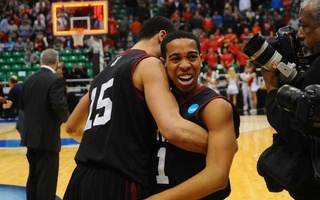Harvard regained its accustomed perch atop the U.S. News and World Report's annual ranking of colleges this year, edging out previously top-ranked Yale and tying with Princeton.
Last year's number three ranking followed six consecutive years in which Harvard reigned supreme. Just as last year's drop resulted from a change in U.S News's methodology, this year's return to the top was largely the result of corrected accounting procedures.
Harvard officials reacted to the news calmly, restating their belief that the rankings are not useful.
"We've been working on that all year, now we believe Harvard is number one in humility," joked University spokesperson Alex Huppe.
Reaction among the class of 2001 was universally positive, but the vast majority of students interviewed said the rankings did not affect their choice of fair Harvard.
"I didn't pay much attention to it, but now that I'm here it makes me feel pretty good, " said Justin V. Skinner '01.
Reaction among parents was somewhat stronger.
"It's about time," said one Class of 2001 mother who requested anonymity lest her son die of embarrassment before classes even start.
President Neil L. Rudenstine declined to comment on the rankings this year, as he has done every year since his appointment.
Huppe said the president and the University do not believe the rankings have any empirical value.
"It's always nice to be ranked highly, but we don't put any stock in these rankings. They're basically just beauty contests," Huppe said. Many schools have sounded similar concerns about the validity of the survey, saying they fear the rankings may have undue influence over students applying to colleges. Duke University, which moved up two spots to tie with Yale for third in this year's survey, released a statement from its president, Nannerl O. Keohane, saying the survey was "good news indeed" but acknowledging "that such surveys, even when they are as positive as this one for Duke, are not the basis on which students and their families should determine college choice. " Survey Methodology The rankings are based both on statistical data and a reputation survey which break down a school's statistics into seven categories: academic reputation, student selectivity, faculty resources, retention rate, financial resources, alumni giving and a "value added" category, calculated by taking the difference between the expected and actual graduation rates. The largest change in the methodology of the survey for this year also resulted in the largest change in rankings. Instead of reporting the composite scores of each school to one decimal place, scores were rounded off to the nearest whole number, creating far more ties between schools than have occurred in the past. Read more in NewsRecommended Articles


















